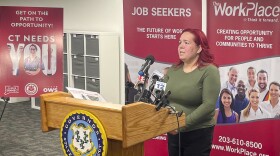Gov. Dannel P. Malloy said today he will explore legislative options to curtail what he called state government's unsustainable, long-term health and pension costs, but he refused to say if he will seek a curb on collective-bargaining rights for state employees.
"We attempted to do that through negotiation. That has failed," Malloy said. "The people of Connecticut still need systemic change and still need to have a sustainable relationship with their employee base, which is a way of saying there is more than one way to get that done."
But exactly how he does propose to get that done?
Under repeated questioning by reporters, Malloy was unwilling or unable to be more specific, just as state union leaders failed Monday to specify how they might salvage a tentative labor savings deal rejected last week, even as they promised to try.
The tentative agreement reached a month ago by negotiators for Malloy and SEBAC, the coalition of state employee unions, would have imposed a two-year wage freeze, but also implemented provisions intended to make long-term savings in healthy and pension costs.
"I believe, ultimately, the strength of what we negotiated with the unions was to bring about systemic change that allowed a sustainable relationship," Malloy said. "In the absence of an agreement to do that, we're going to have to look at doing that by statute."
Pension and health benefits are set by a 20-year agreement labor reached with the administration of Gov. John G. Rowland in 1997, but the power of public-sector employees to negotiate is a function of state law, and state law can be changed.
New Jersey recently stripped all public-sector employees of the right to collectively bargain for health benefits, and even a Democratic legislature in Massachusetts flirted with such a change.
Malloy, the first Democratic governor in Connecticut in 20 years, has strenuously defended collective bargaining right for public employees, criticizing the Republican governors of New Jersey and Wisconsin for their attacks on bargaining rights.
So, his reference today to exploring legislative changes raised questions, but Malloy declined to go deeper into his thinking, other than repeat his demand for a system of benefits that is sustainable.
Asked if the governor had options in mind, his senior adviser, Roy Occhiogrosso, said the governor was "thinking out loud" about an issue that governors in many states are confronting.
Malloy said no legislation would be proposed before the legislature returns in special session Thursday, but he repeatedly gave mixed signals about the scope and timing what he intended.
“We can’t do anything between now and 2017, thanks to agreements that have been entered in the past,” Malloy said. “In the absence, I think we’re going to have to put down a marker that as of 2017 the following things, whatever they are, are going to change.”
Does that mean Connecticut would no longer bargain for health and pensions?
“I’m not saying that,” Malloy said. “What I m saying is Connecticut over the next few months needs to get to a position where we have systemic change.




